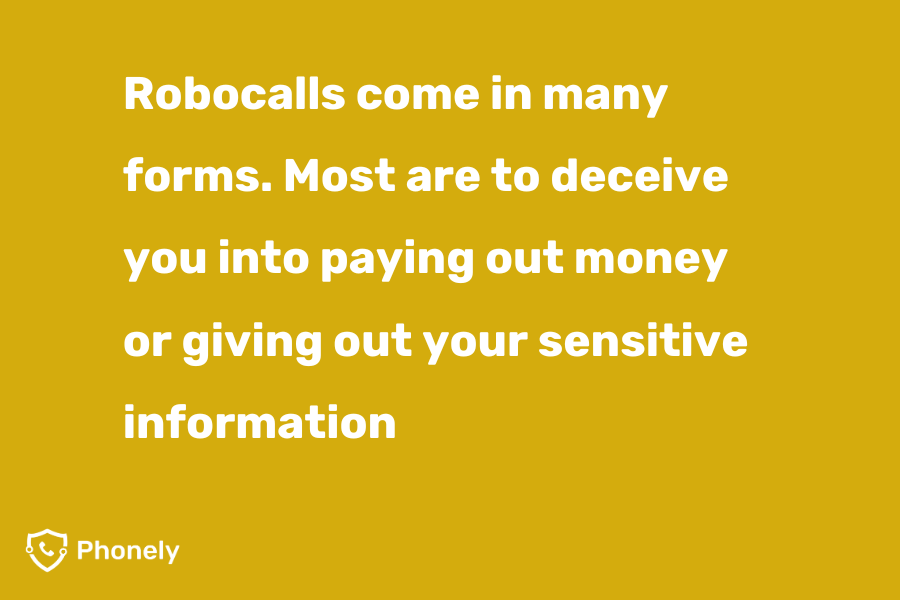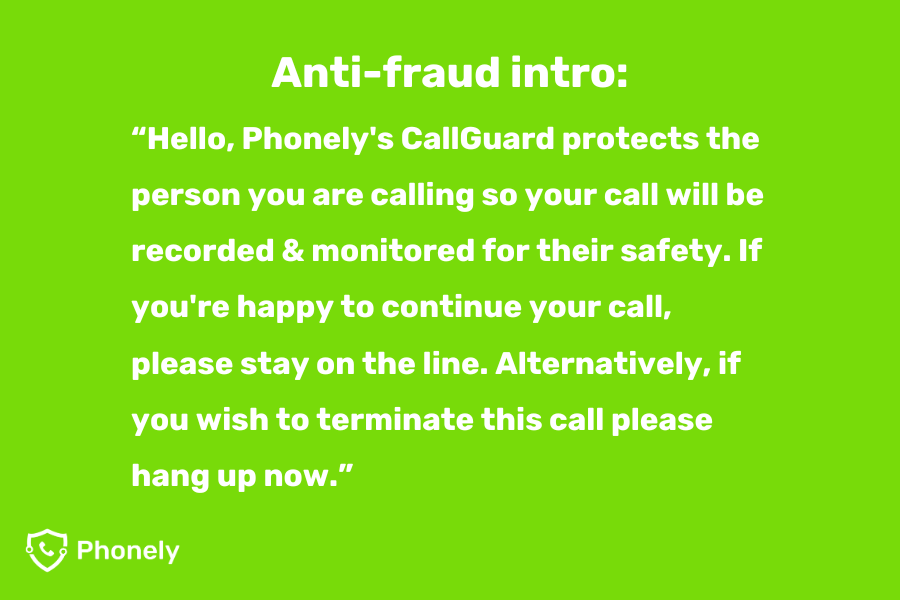Ring, ring! Is it a friend, family member, or another pesky robocall? In 2024, UK consumers received a staggering 129 million fraudulent robocalls. These automated nuisances are more than just annoying-they’re potentially dangerous, especially for vulnerable individuals. But don’t worry! This comprehensive guide will arm you with the knowledge to identify robocalls, protect yourself from their tricks, and effectively stop these unwanted interruptions.
What is a robocall?
A robocall is an automated phone call that plays a pre-recorded message when you answer. While some robocalls serve legitimate purposes, such as reminders from your doctor or school notifications, most are used by scammers trying to steal your personal information or money. The majority of illegal robocalls are designed to convince you to reveal sensitive information or transfer money under false pretences.
Types of robocall scams
Robocallers use various tactics to lure victims. Here are some common types of robocall scams:
- Spoofing or caller ID spoofing: Scammers use fake caller IDs to appear as trusted businesses or local numbers.
- Phishing scams: Criminals pretend to be from government agencies, banks, employers, or old friends to gather personal information.
- Loan scams: Fraudsters offer deals on products and services with hidden fees or high interest rates.
- Phoney debt collectors: They try to collect fake debts or inflated amounts of money.
- Fake charities: Scam artists solicit donations for non-existent causes.
- Scams targeting seniors: These include medical alert scams or fake grandchild emergencies.
- Warrant threats: Criminals claim legal action if immediate payment isn’t made.

The rising tide of VoIP robocalls
Robocalls have become a significant issue in the UK, with their impact growing in both volume and complexity. The rise of VoIP technologies and number spoofing has made it harder to track the origin of calls. In fact, at least 64% of all scam calls made from landlines now use VoIP technology, a 20% increase from the previous year.
This surge has prompted regulators, such as Ofcom, to introduce new scam call-blocking measures. However, the issue remains challenging due to the sophistication of spoofing techniques and the widespread use of VoIP services, which obscure the true location of callers.
What should I do if I answer a robocall?
If you answer a robocall:
1. Hang up immediately.
2. Don’t press any buttons or speak.
3. Never give out personal information.
4. Report the call to the Information Commissioner’s Office (ICO).
Remember, answering a robocall tells scammers that your number is active. This confirmation can lead to more robocalls, as your number might be sold to other scammers.
Are robocalls illegal?
In the UK, many robocalls are illegal, especially those made without prior consent. Businesses must have your explicit permission to send automated marketing calls. If they don’t, they are breaking the law. But even though robocalls are illegal, scammers often operate outside UK laws, making it hard for regulators to stop them.

Recent enforcement actions against robocalls
The ICO recently fined two companies a total of £340,000 for making aggressive and unwanted marketing calls. Cardiff-based Outsource Strategies Ltd was fined £240,000, and London-based Dr Telemarketing Ltd was fined £100,000 for making almost 1.43 million calls to people on the UK’s “do not call” register between February 2021 and March 2022.
How to stop robocalls
Stopping robocalls can seem like an impossible task, but there are effective steps you can take:
Register with the Telephone Preference Service (TPS)
The TPS is a free UK service that allows you to opt out of unsolicited sales and marketing calls. While it’s effective against legitimate businesses, it doesn’t stop criminal robocalls.
Use call blocking apps and services
Popular options include:
- Phonely’s automatic call blocker and anti-fraud intro: Stop robocalls before they connect to your digital landline phone.
- Hiya call blocker: The Hiya app identifies and blocks suspicious numbers on your mobile phone.
- Robokiller app: Uses advanced technology to block robocalls on your mobile device.
- Truecall scam blocker: Filters calls through a database of known scam numbers. Manual updates are required.
- Report suspicious calls: Report robocalls to the ICO to help them take action against scammers. If you have fallen victim to a scam, please report it to Friends Against Scams.
Use your mobile phone’s built-in blocking features
Most smartphones have options to block specific numbers or filter unknown callers.

How Phonely & CallGuard block robocalls
While apps like Hiya and Robokiller offer good protection for mobile users, Phonely’s auto call block feature provides superior real-time protection for landline users.
- Real-time protection: Deters robocallers with anti-fraud introductions. This means the call will be dropped before your phone even rings.
- Adapts to new threats: Unlike Truecall, Phonely’s automatic call blocker protects against constantly changing digital numbers hourly.
- Comprehensive scam protection: Prevents robocalls from connecting, records your calls, and offers you human backup to ensure you’re protected from scam calls.

FAQs about robocalls
Why am I getting so many robocalls?
- Your number may have been sold to scammers.
- Scammers use caller ID spoofing to make calls look legitimate.
- Mass call technology allows scammers to dial thousands of numbers at once.
How can I tell if a call is a robocall?
- There’s a delay before a person or recording speaks.
- The message is generic or uses pressure tactics.
- You’re asked to press a button to speak to someone or opt-out.
Can robocalls hack my phone?
While rare, some sophisticated scammers might try to install malware if you follow their instructions. It’s best to hang up and not engage at all.
Are all auto calls illegal?
No, some automated calls are legal, such as appointment reminders or school closures. However, sales calls without your prior consent are illegal.
How to stop spam calls?
To stop nuisance calls from legitimate businesses, put yourself on the do not call list UK at the TPS. To prevent all scam calls, give Phonely’s CallGuard a try.
How do I get a robocall to stop calling me?
You can stop robocalls by registering with the Telephone Preference Service (TPS) to stop legitimate businesses and using call-blocking services like Phonely’s CallGuard for criminal activity.
What is meant by robocall?
A robocall is an automated phone call that delivers a pre-recorded message, often used for marketing or scams.
Is it better to ignore or decline spam calls?
Answering or declining may signal that your number is active, leading to more calls. However with an auto call blocker you don’t have to worry when you pick up the phone.
Should I block robocall numbers?
Yes, blocking robocall numbers can help reduce unwanted calls, but criminals often change numbers, so automatic call blockers are more effective.
Winning the battle against robocalls
The fight against robocalls is ongoing, but with the right tools and knowledge, you can significantly reduce these annoying and potentially dangerous calls. While mobile apps like Hiya and Robokiller offer some protection on your mobile, Phonely’s comprehensive approach with CallGuard and its auto call blocking and anti-fraud intros provides the most robust defence, especially for digital landlines. What’s more is that auto call blocking is available across all our plans, making scam protection accessible to everyone.
Remember, scammers are constantly updating their tactics, but Phonely’s real-time technology adapts instantly to new threats. By combining Phonely’s powerful features with smart practices like registering with the TPS and being cautious with unknown callers, you can reclaim your confidence and keep your phone line free from unwanted interruptions.
You don’t have to fear your ringing phone any more. Stay informed, stay vigilant, and let Phonely be your shield against the rising tide of robocalls.

Leave a Reply